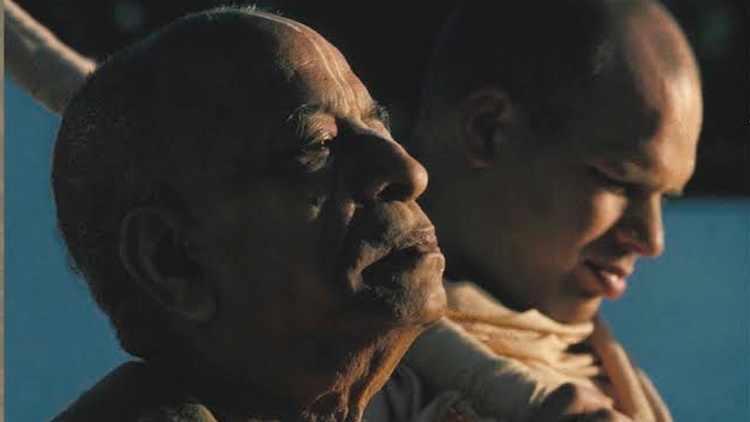New Book “Swamiji” Fills in ISKCON’s Early History
By Madhava Smullen | Oct 23, 2014

“Swamiji,” a new book that recounts Brahmananda Dasa’s memories of his guru Srila Prabhupada, has been called “a long overdue addition to the early history of ISKCON [that] fills in many details only an insider would know” by scholar Thomas J. Hopkins.
Author Satyaraja Das (Steven Rosen), whose previous books include a biography of Bhakti Tirtha Swami and an as-yet-unpublished one of Sridhara Swami, interviewed Brahmananda for two weeks, yielding some twenty 90-minute tapes.
“He told some amazing stories about his early days with Prabhupada, things I had not heard before,” Satyaraja says.
The book begins by discussing the influence Brahmananda’s parents had on him, then the Beatnik and Hippie Culture’s influence, which ultimately led to his meeting Srila Prabhupada.
“I felt as though I was leaving something behind and going to a new place,” says Brahmananda of the meeting. “I knew it was the beginning of an important transformation, a major turning point.”
The book goes on to discuss the formulation of ISKCON and Brahmananda’s key role in many early endeavors, from the first outdoor chanting party to the publishing of Prabhupada’s first books in the West; from serving as Prabhupada’s first temple president at the first ISKCON temple – 26 2nd Avenue in New York – to being one of the first sannyasis in the movement and bringing the first ISKCON deity — Madan Mohan — to ISKCON.

The “Swamiji” book’s cover
“Swamiji” doesn’t shy away from controversy, covering Brahmananda’s expulsion from ISKCON for claiming Prabhupada was God, but also talks about how Prabhupada reportedly forgave him and why.
The book also details Brahmananda’s pioneering missionary work for Prabhupada in Pakistan and Africa, and his role in securing licenses for the Krishna-Balarama temple in Vrindavana from an Indian government only interested in building factories.
“Prabhupada had me and Pranava Dasa, a Hindi speaking devotee, go to Mathura government offices each day, telling us exactly who to see and what to say,” recalls Brahmananda in the book. “In those days, it took a two-hour tanga (donkey cart) ride to get to Mathura. Then we would come back to Prabhupada and report to him, whereupon he would tell us exactly how to reply.”
After two months, the book describes, Prabhupada asked Brahmananda to invite the District Magistrate to the temple site, which he did successfully. After listening patiently and respectfully as Prabhupada spoke about Krishna conscious philosophy and the urgency of his mission, the Magistrate left – and a few days later, to everyone’s surprise (except Srila Prabhupada’s), all the required licenses were granted.
The 185 pages of “Swamiji” are packed with many other similarly fascinating stories of ISKCON’s early days, inspiring author and academic Joshua M. Greene to call it “An important contribution to the ISKCON legacy.”
With a cover design by Vrinda Devi featuring photos of Brahmananda walking on the beach with Srila Prabhupada that captures the mood of the book, “Swamiji” is published by Torchlight and The Bhaktivedanta Research Centre, and will be available on amazon.com by mid-November.
“Writing the book was a blissful experience for me – interviewing Brahmananda deepened my own affection for Prabhupada,” Satyaraja says. “His love is contagious, and, hopefully, the book will serve that same purpose for readers.”















